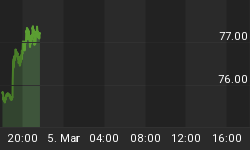We learned on February 27th of the Treasury's plan to convert up to $25 billion of their $45 billion preferred Citigroup shares to common equity. According to the company, the existing shareholders would be diluted by 74%. Thus, the taxpayers will cease collecting dividends on their holdings and they'll slide down the capital structure in Citigroup to the lowest rung on the ladder. Ostensibly, it looks like a good deal for the bank and not such a great deal for the government/taxpayer.
So why would the government allow such a deal to occur? The answer is to gain more control over Citigroup (with other major banks next in line) in order to garner complete control over the money supply. The Treasury's preferred holdings in Citigroup carry no voting rights, whereas the common shares will. After conversion, the government would own 36% of the common stock. The government does not need to be the largest shareholder in the company to dictate policy, but it does greatly facilitate the process. The power grab will increase the Administration's and Fed's ability to direct bank lending, which can lead to an abrogation of the system of checks and balances that control our money supply.
Under "normal" conditions in a fiat currency system, a Central Bank influences the cost of money through the manipulation of the overnight interbank lending rate. In the U.S., the Federal Reserve influences the Fed Funds rate and Discount rate through the everyday operations (buying and selling of Treasuries) of the Federal Open Market Committee (F.O.M.C.). Those rates in turn influence interest rates across the yield curve and therefore, indirectly controlling the cost of money. Additionally, the Federal Reserve directly controls the amount of money in the Monetary Base (high powered money) through the expansion and contraction of its balance sheet. Base money is then used by banks through the Fractional Reserve System to multiply "high powered" money tenfold or greater.
Therefore we know that the amount and cost of money is highly influenced by the government. But the system has built in one key element which allows for a condition of checks and balances to exist. The consumer must still want to borrow and banks must still desire to lend. Unless that situation exists, the larger monetary aggregates will be very slow to increase. And if base money is not loaned into existence, it remains limited in its ability to drive up prices. In today's economy, banks' balance sheets are in disrepair and the consumer has taken on a record amount of debt. Thus, despite the best efforts of the Fed and Administration to force-feed more borrowing, market forces have determined not to increase the amount of debt regardless of its availability or rate.
However, none other than Ben Bernanke himself said at his February 25th House Financial Services Committee hearing that the Treasury may own a "substantial minority" of banks' common shares. Their goal is not to nationalize banks but to garner significant control. If they can control the lending practices of financial institutions, they dominate all three factors in the process that determine the supply of money -- the quantity of base money, the level of interest rates and the amount of lending provided by banks.
The U.S. government would then be able to expand the money supply buy purchasing Treasury's burgeoning debt relatively unfettered. The American consumer, businesses and banks may be cut out of the equation. All that will matter is government's desire to spend our way out of a depression and their ability to finance it with alacrity. As of today there are $673 billion in excess reserves sitting on the Fed's balance sheet, which government can then use to purchase Treasuries and keep yields low by forcing banks to finance their spending plans.
One of the most important freedoms which made America great was the protection of the purchasing power of our money. The wisdom of our founding fathers was such that they understood the cornerstone for a successful economy was to ensure the stability of our nation's currency. While that protection began to be eroded with the signing of the Federal Reserve Act of 1913, we may now be abdicating complete control of our money supply to the government. If so, we'll be able to thank our government for not only creating a depression, but making sure it is accompanied by intractable inflation.
Be sure to listen in on my Mid-Week Reality Check.















